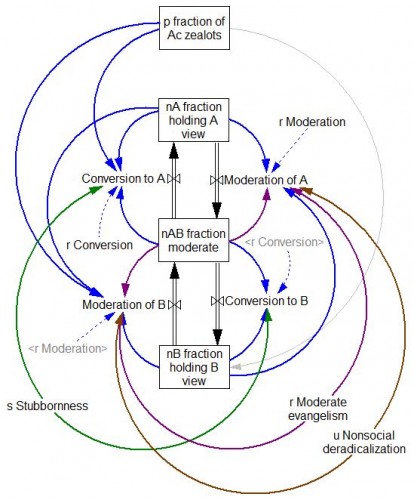An interesting paper on Arxiv caught my eye the other day. It uses a simple model of a bipolar debate to explore policies that encourage moderation.
Some of the most pivotal moments in intellectual history occur when a new ideology sweeps through a society, supplanting an established system of beliefs in a rapid revolution of thought. Yet in many cases the new ideology is as extreme as the old. Why is it then that moderate positions so rarely prevail? Here, in the context of a simple model of opinion spreading, we test seven plausible strategies for deradicalizing a society and find that only one of them significantly expands the moderate subpopulation without risking its extinction in the process.
This is a very simple and stylized model, but in the best tradition of model-based theorizing, it yields provocative counter-intuitive results and raises lots of interesting questions. Technology Review’s Arxiv Blog has a nice qualitative take on the work.
See also: Dynamics of Scientific Revolutions, Bifurcations & Filter Bubbles
The model runs in discrete time, but I’ve added implicit rate constants for dimensional consistency in continuous time.
commitment2.mdl & commitment2.vpm
These should be runnable with any Vensim version.
If you add the asymmetric generalizations in the paper’s Supplemental Material, add your name to the model diagram, forward a copy back to me, and I’ll post the update.


2 thoughts on “Encouraging Moderation”